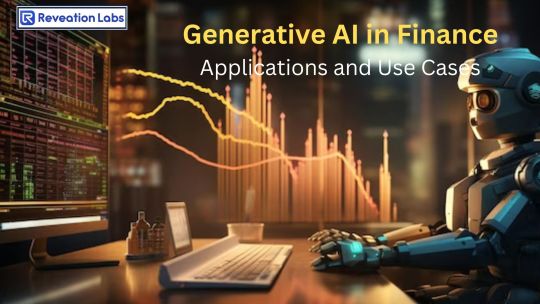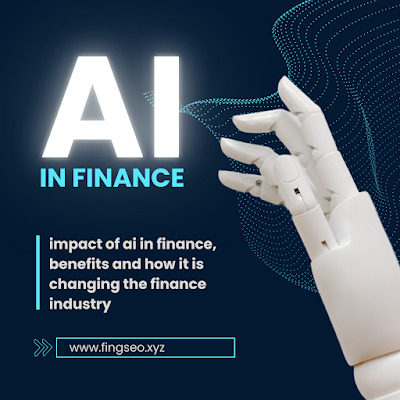#AI in finance
Text
AI in Finance: Enhancing Decision-Making
Introduction: The Role of Artificial Intelligence in Revolutionizing Financial Decision-Making
Artificial Intelligence (AI) has emerged as a game-changer in various industries, and the financial sector is no exception. With its ability to process vast amounts of data, identify patterns, and make predictions, AI is revolutionizing decision-making in finance. From trading and risk management to…

View On WordPress
#ai for finance#ai in business#ai in finance#ai in finances#artificial intelligence for finance#artificial intelligence in business#artificial intelligence in finance#what does ai do for finance
2 notes
·
View notes
Text
The Future of Personal Banking: Generative AI in Finance Applications

The banking sector is on the verge of a revolutionary reform with the introduction of generative AI that changes the view of personal banking. Envision a society where your bank not only you as a customer, but almost like a best friend—a friend who knows what you need, handles your expenses for you, and even shares tips on how to manage your finances and grow wealth. This is no futuristic story; this is almost our reality now due to fast growth of AI in Fintech industry.
Personalized Financial Guidance at Your Fingertips
Generative AI is not only about the replacement or automation of tasks but also about the formation of systems that can learn from data and produce humanized responses. This feature is utilized by AI Development company to redefine the customer interfaces in banking. Through chatbot development services which ensure 24/7 customer care to complex generative AI development services which impart personalized financial advice, the range of possible applications is broad and interesting.
For instance, think of a chatbot that doesn't simply answer your questions, but instead understands your financial trends, recommends you ways to save money, and alerts you about promising investments. Such kind of individual approach used to belong to those who specialized on personal financial advisory. Today, it is scalable to millions, resulting in the wide dissemination of good financial counseling.
Enhancing Security with Predictive AI
A noticeable benefit of the use of AI in personal banking is that it increases the level of security. Generative AI can recognize and detect fraudulent activities through recognition of transaction patterns that deviate from user's habitual financial behavior. This approach not only protects your assets but also builds up the trust for digital banking platforms.
Streamlining Operations and Reducing Costs
Banks are applying AI in two areas: customer experience improvement and the streamlining of operations and cost cutting. The automation of routine tasks enables banks to divert their resources to more important areas, for example product development and customer relationship management. This operational efficiency is precisely what you need in a highly competitive environment where the ability to cut costs and increase service at the same time can be a game-changer.
Future Prospects: AI as a Financial Advisor
The future of generative AI in the context of personal banking can only be predicted to be limitless. Think of AI systems that will negotiate better rates for you in a mortgage, invest in stocks with high returns or even manage your entire financial portfolio depending on live market data. These innovations could enhance the availability and lower expenses of financial advice, thus transforming personal banking into a more customer-oriented and technology-based industry.
The introduction of AI into the personal banking sphere necessitates that banking is not only efficient but also aligned with individual goals and dreams. It represents a win-win situation that suits both banks and customers who join forces to make modern financial experience more efficient and personal.
#ai in finance#ai development#ai developers#hire ai developers#business#hire chatbot developers#generative ai development services
0 notes
Text
youtube
Unlocking the Future: AI Revolutionizing Finance Industry
Welcome to Financial Life, where we learn about finance and technology. In our latest video, we uncover the revolutionary impact of artificial intelligence on the financial landscape. So, let's watch the full video and learn about AI Revolutionizing Finance Industry.
👉 Subscribe to my channel to stay tuned: https://bit.ly/4aXYMxD
In today's video, we discover how Artificial Intelligence is revolutionizing the finance industry. Let's watch the entire video and learn about the impact of AI on financial services and how it is shaping the future of the industry. Unlock the potential of AI in finance with this informative video!
Explore the cutting-edge fusion of finance and technology in our latest video, 'Unlocking the Future: How AI is Revolutionizing Finance.' Delve into the transformative power of artificial intelligence (AI) as it reshapes the financial landscape, from personalized banking experiences to lightning-fast stock trading insights.
Discover how AI is revolutionizing the finance industry in this insightful video. Learn how artificial intelligence is transforming the way financial institutions operate and make decisions.
Join us on this journey as we uncover the mind-bending potential of AI and its profound impact on the way we interact with money and investments. Don't forget to like, share, and subscribe for more content on the intersection of technology and finance.
#ai in personal finance#finance#ai revolutionizing finance industry#artificial intelligence#ai in finance#ai use case in finance#ai applications in finance#mind-blowing ai uses in finance#ai in finance and banking#using ai in finance#Youtube
0 notes
Text
0 notes
Text
0 notes
Text
Transforming Customer Engagement: The Impact of Generative AI in BFSI
In the fast-evolving landscape of the Banking, Financial Services, and Insurance (BFSI) sector, staying ahead of the curve is crucial for maintaining a competitive edge. One of the key technologies driving this transformation is Generative Artificial Intelligence (Generative AI). This cutting-edge technology is revolutionizing the way BFSI institutions engage with their customers, offering personalized experiences that were once thought impossible. In this blog, we will explore the role of Generative AI in shaping personalized customer experiences across different facets of the BFSI sector, including Banking, Lending, and Insurance.
Generative AI in Banking:
Banks have been at the forefront of adopting new technologies to enhance customer experiences. Generative AI plays a pivotal role in this regard by enabling banks to offer hyper-personalized services tailored to individual customer needs. One of the primary applications of Generative AI in banking is in customer interactions. Chatbots powered by Generative AI algorithms can engage with customers in natural language, providing real-time assistance and information.
These AI-driven virtual assistants can handle a wide range of queries, from account balances and transaction histories to guiding customers through complex financial processes. Moreover, Generative AI in banking enables banks to analyze customer data in real-time, allowing for more accurate and personalized recommendations, such as suitable financial products, investment opportunities, and savings plans.
Generative AI in Lending:
In the lending landscape, Generative AI in lending is revolutionizing the way institutions evaluate creditworthiness and process loan applications. Traditional credit scoring models often rely on historical data, which may not fully capture an individual's current financial situation. Generative AI algorithms, on the other hand, can analyze vast datasets in real-time, incorporating not just historical credit data but also a customer's current financial behavior.
This dynamic assessment enables lenders to make more informed decisions, resulting in a more accurate evaluation of an individual's credit risk. Furthermore, Generative AI facilitates the creation of personalized loan offers based on a borrower's unique financial profile. This not only improves the chances of approval but also enhances the overall borrowing experience for customers.
Generative AI in Insurance:
The insurance sector, notorious for its complexity and paperwork, is undergoing a significant transformation with the integration of Generative AI. Insurers are leveraging this technology to streamline processes, enhance risk assessment, and, most importantly, provide personalized insurance solutions. Generative AI in Insurance algorithms can analyze diverse data sources, including social media activity, health records, and lifestyle choices, to create a comprehensive and individualized risk profile for each customer.
For instance, in health insurance, Generative AI can assess an individual's health data to tailor insurance plans that align with their specific needs. Similarly, in property and casualty insurance, Generative AI can analyze geographical and environmental data to offer personalized coverage options based on the unique risks associated with a customer's location.
Challenges and Considerations:
While the integration of Generative AI in BFSI brings about numerous benefits, it also presents challenges and considerations. Privacy and data security are paramount concerns, especially when dealing with sensitive financial information. BFSI institutions must prioritize robust cybersecurity measures to protect customer data and ensure compliance with regulatory standards.
Additionally, the explainability of Generative AI models is a crucial factor. As these algorithms become more complex, understanding the reasoning behind their decisions becomes challenging. BFSI institutions need to strike a balance between the benefits of advanced AI and the transparency required for customer trust and regulatory compliance.
The Future Landscape:
As technology continues to advance, the role of Generative AI in BFSI will likely expand further. The integration of augmented reality and virtual reality technologies may enable immersive and personalized banking experiences. Virtual financial advisors powered by Generative AI could provide real-time investment advice based on market conditions and individual financial goals.
Furthermore, the use of Generative AI in fraud detection and prevention will become increasingly sophisticated. By analyzing patterns of behavior and transaction data, these algorithms can identify anomalies indicative of fraudulent activity, offering a proactive approach to safeguarding customer accounts.
Conclusion:
Generative AI is undeniably transforming the BFSI sector, shaping personalized customer experiences in banking, lending, and insurance. The ability to analyze vast datasets in real-time, coupled with natural language processing capabilities, empowers BFSI institutions to offer tailored solutions and services to individual customers. While challenges such as data privacy and model explainability persist, the benefits of Generative AI in enhancing customer engagement, streamlining processes, and improving decision-making are too significant to ignore. As we look towards the future, the continued evolution of Generative AI promises to redefine the way customers interact with BFSI institutions, creating a more personalized and efficient financial landscape for all.
0 notes
Text
How I got scammed

If you'd like an essay-formatted version of this post to read or share, here's a link to it on pluralistic.net, my surveillance-free, ad-free, tracker-free blog:
https://pluralistic.net/2024/02/05/cyber-dunning-kruger/#swiss-cheese-security

I wuz robbed.
More specifically, I was tricked by a phone-phisher pretending to be from my bank, and he convinced me to hand over my credit-card number, then did $8,000+ worth of fraud with it before I figured out what happened. And then he tried to do it again, a week later!
Here's what happened. Over the Christmas holiday, I traveled to New Orleans. The day we landed, I hit a Chase ATM in the French Quarter for some cash, but the machine declined the transaction. Later in the day, we passed a little credit-union's ATM and I used that one instead (I bank with a one-branch credit union and generally there's no fee to use another CU's ATM).
A couple days later, I got a call from my credit union. It was a weekend, during the holiday, and the guy who called was obviously working for my little CU's after-hours fraud contractor. I'd dealt with these folks before – they service a ton of little credit unions, and generally the call quality isn't great and the staff will often make mistakes like mispronouncing my credit union's name.
That's what happened here – the guy was on a terrible VOIP line and I had to ask him to readjust his mic before I could even understand him. He mispronounced my bank's name and then asked if I'd attempted to spend $1,000 at an Apple Store in NYC that day. No, I said, and groaned inwardly. What a pain in the ass. Obviously, I'd had my ATM card skimmed – either at the Chase ATM (maybe that was why the transaction failed), or at the other credit union's ATM (it had been a very cheap looking system).
I told the guy to block my card and we started going through the tedious business of running through recent transactions, verifying my identity, and so on. It dragged on and on. These were my last hours in New Orleans, and I'd left my family at home and gone out to see some of the pre-Mardi Gras krewe celebrations and get a muffalata, and I could tell that I was going to run out of time before I finished talking to this guy.
"Look," I said, "you've got all my details, you've frozen the card. I gotta go home and meet my family and head to the airport. I'll call you back on the after-hours number once I'm through security, all right?"
He was frustrated, but that was his problem. I hung up, got my sandwich, went to the airport, and we checked in. It was total chaos: an Alaska Air 737 Max had just lost its door-plug in mid-air and every Max in every airline's fleet had been grounded, so the check in was crammed with people trying to rebook. We got through to the gate and I sat down to call the CU's after-hours line. The person on the other end told me that she could only handle lost and stolen cards, not fraud, and given that I'd already frozen the card, I should just drop by the branch on Monday to get a new card.
We flew home, and later the next day, I logged into my account and made a list of all the fraudulent transactions and printed them out, and on Monday morning, I drove to the bank to deal with all the paperwork. The folks at the CU were even more pissed than I was. The fraud that run up to more than $8,000, and if Visa refused to take it out of the merchants where the card had been used, my little credit union would have to eat the loss.
I agreed and commiserated. I also pointed out that their outsource, after-hours fraud center bore some blame here: I'd canceled the card on Saturday but most of the fraud had taken place on Sunday. Something had gone wrong.
One cool thing about banking at a tiny credit-union is that you end up talking to people who have actual authority, responsibility and agency. It turned out the the woman who was processing my fraud paperwork was a VP, and she decided to look into it. A few minutes later she came back and told me that the fraud center had no record of having called me on Saturday.
"That was the fraudster," she said.
Oh, shit. I frantically rewound my conversation, trying to figure out if this could possibly be true. I hadn't given him anything apart from some very anodyne info, like what city I live in (which is in my Wikipedia entry), my date of birth (ditto), and the last four digits of my card.
Wait a sec.
He hadn't asked for the last four digits. He'd asked for the last seven digits. At the time, I'd found that very frustrating, but now – "The first nine digits are the same for every card you issue, right?" I asked the VP.
I'd given him my entire card number.
Goddammit.
The thing is, I know a lot about fraud. I'm writing an entire series of novels about this kind of scam:
https://us.macmillan.com/books/9781250865878/thebezzle
And most summers, I go to Defcon, and I always go to the "social engineering" competitions where an audience listens as a hacker in a soundproof booth cold-calls merchants (with the owner's permission) and tries to con whoever answers the phone into giving up important information.
But I'd been conned.
Now look, I knew I could be conned. I'd been conned before, 13 years ago, by a Twitter worm that successfully phished out of my password via DM:
https://locusmag.com/2010/05/cory-doctorow-persistence-pays-parasites/
That scam had required a miracle of timing. It started the day before, when I'd reset my phone to factory defaults and reinstalled all my apps. That same day, I'd published two big online features that a lot of people were talking about. The next morning, we were late getting out of the house, so by the time my wife and I dropped the kid at daycare and went to the coffee shop, it had a long line. Rather than wait in line with me, my wife sat down to read a newspaper, and so I pulled out my phone and found a Twitter DM from a friend asking "is this you?" with a URL.
Assuming this was something to do with those articles I'd published the day before, I clicked the link and got prompted for my Twitter login again. This had been happening all day because I'd done that mobile reinstall the day before and all my stored passwords had been wiped. I entered it but the page timed out. By that time, the coffees were ready. We sat and chatted for a bit, then went our own ways.
I was on my way to the office when I checked my phone again. I had a whole string of DMs from other friends. Each one read "is this you?" and had a URL.
Oh, shit, I'd been phished.
If I hadn't reinstalled my mobile OS the day before. If I hadn't published a pair of big articles the day before. If we hadn't been late getting out the door. If we had been a little more late getting out the door (so that I'd have seen the multiple DMs, which would have tipped me off).
There's a name for this in security circles: "Swiss-cheese security." Imagine multiple slices of Swiss cheese all stacked up, the holes in one slice blocked by the slice below it. All the slices move around and every now and again, a hole opens up that goes all the way through the stack. Zap!
The fraudster who tricked me out of my credit card number had Swiss cheese security on his side. Yes, he spoofed my bank's caller ID, but that wouldn't have been enough to fool me if I hadn't been on vacation, having just used a pair of dodgy ATMs, in a hurry and distracted. If the 737 Max disaster hadn't happened that day and I'd had more time at the gate, I'd have called my bank back. If my bank didn't use a slightly crappy outsource/out-of-hours fraud center that I'd already had sub-par experiences with. If, if, if.
The next Friday night, at 5:30PM, the fraudster called me back, pretending to be the bank's after-hours center. He told me my card had been compromised again. But: I hadn't removed my card from my wallet since I'd had it replaced. Also, it was half an hour after the bank closed for the long weekend, a very fraud-friendly time. And when I told him I'd call him back and asked for the after-hours fraud number, he got very threatening and warned me that because I'd now been notified about the fraud that any losses the bank suffered after I hung up the phone without completing the fraud protocol would be billed to me. I hung up on him. He called me back immediately. I hung up on him again and put my phone into do-not-disturb.
The following Tuesday, I called my bank and spoke to their head of risk-management. I went through everything I'd figured out about the fraudsters, and she told me that credit unions across America were being hit by this scam, by fraudsters who somehow knew CU customers' phone numbers and names, and which CU they banked at. This was key: my phone number is a reasonably well-kept secret. You can get it by spending money with Equifax or another nonconsensual doxing giant, but you can't just google it or get it at any of the free services. The fact that the fraudsters knew where I banked, knew my name, and had my phone number had really caused me to let down my guard.
The risk management person and I talked about how the credit union could mitigate this attack: for example, by better-training the after-hours card-loss staff to be on the alert for calls from people who had been contacted about supposed card fraud. We also went through the confusing phone-menu that had funneled me to the wrong department when I called in, and worked through alternate wording for the menu system that would be clearer (this is the best part about banking with a small CU – you can talk directly to the responsible person and have a productive discussion!). I even convinced her to buy a ticket to next summer's Defcon to attend the social engineering competitions.
There's a leak somewhere in the CU systems' supply chain. Maybe it's Zelle, or the small number of corresponding banks that CUs rely on for SWIFT transaction forwarding. Maybe it's even those after-hours fraud/card-loss centers. But all across the USA, CU customers are getting calls with spoofed caller IDs from fraudsters who know their registered phone numbers and where they bank.
I've been mulling this over for most of a month now, and one thing has really been eating at me: the way that AI is going to make this kind of problem much worse.
Not because AI is going to commit fraud, though.
One of the truest things I know about AI is: "we're nowhere near a place where bots can steal your job, we're certainly at the point where your boss can be suckered into firing you and replacing you with a bot that fails at doing your job":
https://pluralistic.net/2024/01/15/passive-income-brainworms/#four-hour-work-week
I trusted this fraudster specifically because I knew that the outsource, out-of-hours contractors my bank uses have crummy headsets, don't know how to pronounce my bank's name, and have long-ass, tedious, and pointless standardized questionnaires they run through when taking fraud reports. All of this created cover for the fraudster, whose plausibility was enhanced by the rough edges in his pitch - they didn't raise red flags.
As this kind of fraud reporting and fraud contacting is increasingly outsourced to AI, bank customers will be conditioned to dealing with semi-automated systems that make stupid mistakes, force you to repeat yourself, ask you questions they should already know the answers to, and so on. In other words, AI will groom bank customers to be phishing victims.
This is a mistake the finance sector keeps making. 15 years ago, Ben Laurie excoriated the UK banks for their "Verified By Visa" system, which validated credit card transactions by taking users to a third party site and requiring them to re-enter parts of their password there:
https://web.archive.org/web/20090331094020/http://www.links.org/?p=591
This is exactly how a phishing attack works. As Laurie pointed out, this was the banks training their customers to be phished.
I came close to getting phished again today, as it happens. I got back from Berlin on Friday and my suitcase was damaged in transit. I've been dealing with the airline, which means I've really been dealing with their third-party, outsource luggage-damage service. They have a terrible website, their emails are incoherent, and they officiously demand the same information over and over again.
This morning, I got a scam email asking me for more information to complete my damaged luggage claim. It was a terrible email, from a noreply@ email address, and it was vague, officious, and dishearteningly bureaucratic. For just a moment, my finger hovered over the phishing link, and then I looked a little closer.
On any other day, it wouldn't have had a chance. Today – right after I had my luggage wrecked, while I'm still jetlagged, and after days of dealing with my airline's terrible outsource partner – it almost worked.
So much fraud is a Swiss-cheese attack, and while companies can't close all the holes, they can stop creating new ones.
Meanwhile, I'll continue to post about it whenever I get scammed. I find the inner workings of scams to be fascinating, and it's also important to remind people that everyone is vulnerable sometimes, and scammers are willing to try endless variations until an attack lands at just the right place, at just the right time, in just the right way. If you think you can't get scammed, that makes you especially vulnerable:
https://pluralistic.net/2023/02/24/passive-income/#swiss-cheese-security

Image:
Cryteria (modified)
https://commons.wikimedia.org/wiki/File:HAL9000.svg
CC BY 3.0
https://creativecommons.org/licenses/by/3.0/deed.en
10K notes
·
View notes
Text
#AI#AI in finance#Fintech#artificial intelligence#Financial services#Fintech startup#ChatBot in finance#ediiie
0 notes
Text
0 notes
Text
0 notes
Text
Generative AI in Finance: Applications and Use Cases

Curious about the role of Generative AI in predicting market trends and optimizing financial strategies?
Then let’s explore the fascinating world of Generative AI and its game-changing applications in finance.
What’s Generative AI?
Generative AI is a type of artificial intelligence that creates new and valuable content, such as text, images, or even financial models, on its own.
Significance of Generative AI in Enhancing Financial Processes
In the financial sector, AI has come a long way, evolving to play a crucial role in various processes.
Over time, AI has transformed how the financial industry operates. Initially, it was used for basic tasks, but advancements have enabled AI to handle more complex responsibilities. In finance, AI has become a powerful tool for analyzing data, predicting trends, and making informed decisions.
By utilizing Generative AI, financial institutions can streamline their operations, reduce errors, and adapt to the dynamic nature of the market. This technology has the potential to revolutionize how we approach financial tasks and create more efficient and effective processes.
Full Blog: Generative AI in Finance: Applications and Use Cases
0 notes
Text
How ai is changing the finance industry

Click here to learn
https://www.fingseo.xyz/2023/09/ai-in-finance-impact-and-uses.html?m=1
0 notes
Text
Unlocking the Potential of Generative AI in Personal Finance Management
Discover the rising popularity of using generative AI in personal financial management, as revealed in a new study. Learn about the areas of interest, user trust, and financial goals driving this trend.
0 notes
Text
Transforming Noisy Investor Reactions into Actionable Financial Insights with ChatGPT
Disclaimer : The information in this post is intended for informational purposes only and should not be considered investment advice. Prior to making any investment decisions, conduct your own research and consult with a financial advisor.
(Images generated by author with DALL·E / Bing Image Creator)
In the finance world, earnings season is always a busy time for investors. Once those quarterly…

View On WordPress
#AI in finance#AI-driven investment insights#ChatGPT insights#Financial intelligence#Financial market commentary#Investment decision-making#Investor sentiment#Investor sentiment analysis#Investor sentiment trends#Market analysis with AI#Share buyback
0 notes
Text
AI in Fintech Market: Global Industry Trends, Share, Size, Growth, Opportunity and Forecast 2023-2028
Request to get the sample report: https://www.imarcgroup.com/ai-in-fintech-market/requestsample
AI in Fintech Market Trends:
The rapid digitization of the banking, financial services and insurance (BFSI) industry across the globe is one of the key factors driving the growth of the market. AI in fintech is widely used for operating virtual assistance, debt collection, sentiment and predictive analysis, reporting and customer behavior analysis. It enhances efficiency, minimizes the chances of human error and can process large volumes of data in a short period.
0 notes